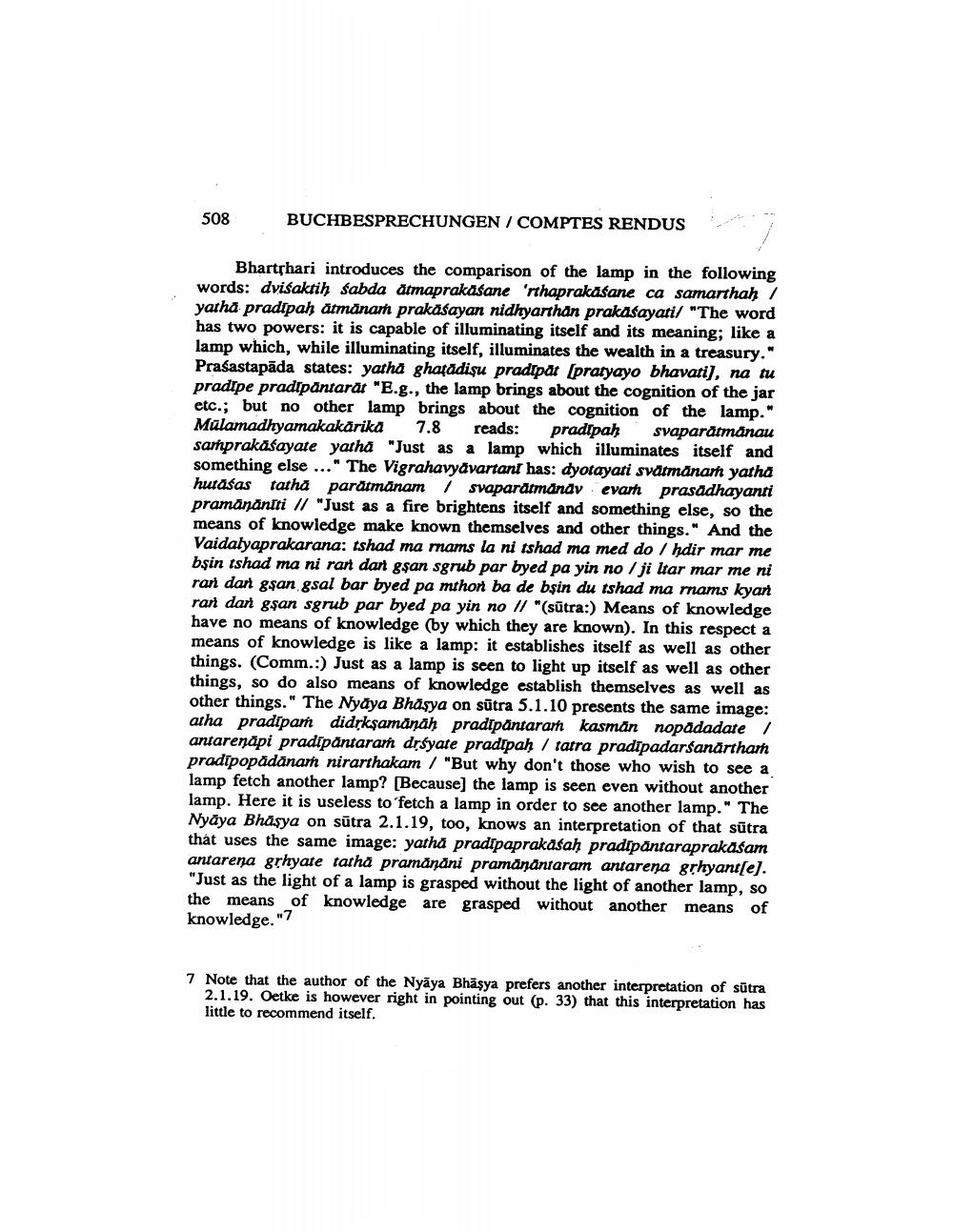Book Title: Buchbesprechungen Comptes Rendus Author(s): Johannes Bronkhorst Publisher: Johannes Bronkhorst View full book textPage 8
________________ 508 BUCHBESPRECHUNGEN / COMPTES RENDUS Bhart[hari introduces the comparison of the lamp in the following words: dvišaktih sabda åtmaprakasane 'rthaprakasane ca samarthah / yatha pradipah atmänarh prakasayan nidhyarthan prakaśayati/ "The word has two powers: it is capable of illuminating itself and its meaning: like a lamp which, while illuminating itself, illuminates the wealth in a treasury." Prasastapāda states: yatha ghatádişu pradipat (pratyayo bhavati), na tu pradipe pradtpantarat "E.g., the lamp brings about the cognition of the jar etc.; but no other lamp brings about the cognition of the lamp." Mulamadhyamakakārika 7.8 reads: prad[pah svaparātmanau samprakasayate yatha "Just as a lamp which illuminates itself and something else ..." The Vigrahavyävartant has: dyotayari svatmanamh yatha hutašas tatha parātmānam / svaparátmándy evan prasadhayanti pramänānīti // "Just as a fire brightens itself and something else, so the means of knowledge make known themselves and other things." And the Vaidalyaprakarana: tshad ma mnams la ni tshad ma med do / hdir mar me bşin tshad ma ni rart dan gşan sgrub par byed pa yin no / ji ltar mar me ni ran dan gşan gsal bar byed pa mthon ba de bşin du tshad ma mnams kyan ran dan gşan sgrub par byed pa yin no // "(sūtra:) Means of knowledge have no means of knowledge (by which they are known). In this respect a means of knowledge is like a lamp: it establishes itself as well as other things. (Comm.:) Just as a lamp is seen to light up itself as well as other things, so do also means of knowledge establish themselves as well as other things." The Myaya Bhäşya on sūtra 5.1.10 presents the same image: atha pradipar didrkşamänāh pradipantararh kasman nopadadate / antarenäpi pradipantaram drsyate pradipah / tatra pradipadarśanartham pradipopadanamh nirarthakam / "But why don't those who wish to see a lamp fetch another lamp? (Because] the lamp is seen even without another lamp. Here it is useless to fetch a lamp in order to see another lamp." The Nyāya Bhasya on sūtra 2.1.19, too, knows an interpretation of that sūtra that uses the same image: yatha pradipaprakasah pradipāntaraprakasam antarena grhyate tatha pramänäni pramänäntaram antarena grhyant[e]. "Just as the light of a lamp is grasped without the light of another lamp, so the means of knowledge are grasped without another means of knowledge." 7 Note that the author of the Nyāya Bhāşya prefers another interpretation of sūtra 2.1.19. Oetke is however right in pointing out (p. 33) that this interpretation has little to recommend itself.Page Navigation
1 ... 6 7 8 9 10
